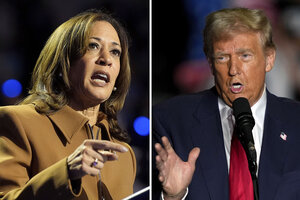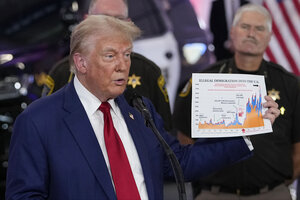By tapping JD Vance, Trump charts MAGA’s future
Loading...
By naming Ohio Sen. J.D. Vance as his running mate, former President Donald Trump has picked an articulate young firebrand whose politics align closely with his own. It’s a ticket that reinforces Mr. Trump’s makeover of the Republican Party. Should they be elected in November, Senator Vance would become a next-generation leader of Mr. Trump’s MAGA movement at age 40 and his presumed successor.
Mr. Vance – a first-term senator – has not passed any significant legislation since being elected in 2022, making his mark instead in foreign policy as a staunch opponent of U.S. aid to Ukraine. But that could be a plus among voters who distrust the compromises involved in governing.
Why We Wrote This
While many presidential candidates choose a running mate who will balance out some aspect of the ticket, Donald Trump picked a partner who above all will reinforce and perhaps extend his brand.
“There’s less of a premium, or almost a negative premium, for having political experience,” says Matt Grossmann, a politics professor at Michigan State University.
Mr. Vance, who recounted growing up in a working-class Ohio family struggling with poverty and addiction in his bestselling 2016 memoir, “Hillbilly Elegy,” could also broaden the ticket’s appeal in the Midwest. Mr. Trump cited his running mate’s efforts on behalf of “workers and farmers” in Pennsylvania, Michigan, Wisconsin, Ohio, and Minnesota. Of these, Mr. Trump only carried Ohio in 2020.
By naming Ohio Sen. J.D. Vance as his running mate, former President Donald Trump has picked an articulate young firebrand whose politics align closely with his own. It’s a ticket that reinforces Mr. Trump’s root-and-branch makeover of the Republican Party in his own image, one that Senator Vance, a self-described “Never Trump guy”-turned-archloyalist, has come to embrace and embody: pugnacious, populist, and nationalist.
Mr. Vance, a first-term senator just shy of his 40th birthday, is one of the youngest vice presidential candidates in U.S. history. Should he be elected in November, he would become a next-generation leader of Mr. Trump’s “Make America Great Again” movement and his presumed successor, given Mr. Trump’s advanced age and presidential term limits.
As the author of “Hillbilly Elegy,” his popular memoir about growing up in Ohio in a working-class family struggling with poverty and addiction, Mr. Vance could also help the GOP ticket in key Midwestern states that Mr. Trump lost in 2020. On his social media platform, Mr. Trump wrote Monday that his vice presidential pick would “be strongly focused on the people he fought so brilliantly for, the American Workers and Farmers in Pennsylvania, Michigan, Wisconsin, Ohio, Minnesota, and far beyond.” Of these, only Senator Vance’s home state of Ohio was carried by Mr. Trump in 2020.
Why We Wrote This
While many presidential candidates choose a running mate who will balance out some aspect of the ticket, Donald Trump picked a partner who above all will reinforce and perhaps extend his brand.
Whether vice presidential candidates in the modern era can deliver home states or regions or have much of an electoral impact overall is debatable, says Matt Grossmann, a political science professor at Michigan State University. What is clear, however, is that candidates who have little or no experience in government have become increasingly attractive to voters, who distrust the compromises involved in governing and prefer neophytes who haven’t blemished their records with hard choices.
“Across all elections, but especially in Republican primaries, there’s less of a premium, or almost a negative premium, for having political experience,” says Professor Grossmann, who directs the Institute for Public Policy and Social Research.
From the Rust Belt to venture capitalism
James David Vance came to prominence with the success of his 2016 bestseller, “Hillbilly Elegy: A Memoir of a Family and Culture in Crisis,” about growing up in the Rust Belt town of Middletown, Ohio. Reviewers praised the book as a window into the distress experienced by deindustrialized regions in an era of bipartisan support in Washington for free-trade deals. Mr. Trump’s surprise election win and his evocation of communities that had been “left behind” boosted the well-timed book, which was later turned into a film by director Ron Howard.
Senator Vance served in the Marine Corps and then attended Ohio State University and Yale Law School, where a professor encouraged him to write a memoir. He worked for a venture capital firm in San Francisco, investing in tech companies, before moving back to Ohio, where he started a nonprofit working to tackle addiction and other issues. The nonprofit shut down after two years. Mr. Vance pivoted to politics after Ohio Sen. Rob Portman announced his retirement, creating an open seat in 2022.
In a crowded 2022 GOP Senate primary, Mr. Vance had the backing of Mr. Trump’s son, Donald Trump Jr., as well as Peter Thiel, a Silicon Valley billionaire known for his libertarian politics. Mr. Vance won the primary after Mr. Trump endorsed him toward the end over more experienced Ohio politicians, and the first-time candidate went on to a solid general election victory over his Democratic rival, Rep. Tim Ryan.
The endorsement came after Mr. Vance apologized for his past criticisms of Mr. Trump, including comparing him in 2016 to Adolf Hitler. He said Mr. Trump turned out to be a “great president” who had proved him and other doubters wrong. He has indicated that he would have made a different decision on Jan. 6, 2021, than then-Vice President Mike Pence, whose refusal to bend to Mr. Trump’s pressure to challenge the certification of the election was part of what fueled the riot at the U.S. Capitol.
“If I had been vice president, I would have told the states like Pennsylvania, Georgia, and so many others that we needed to have multiple slates of electors, and I think the U.S. Congress should have fought over it from there,” Senator Vance told ABC’s George Stephanopoulos earlier this year.
What Vance brings to the ticket
To Mr. Trump, who never held public office before he became president, Senator Vance’s relative lack of experience in government was not disqualifying. Unlike in 2016, when Mr. Trump chose former Indiana Governor Pence as his running mate to bolster his standing with evangelical conservatives, Mr. Trump isn’t trying to win over skeptical GOP constituencies.
In fact, the choice of Senator Vance indicates the opposite. “It’s not about outreach,” says Joel Goldstein, professor emeritus of law at St. Louis University and an expert on the vice presidency. “It’s totally reinforcing.”
This reflects Mr. Trump’s current strength – both within his party and in the race against President Joe Biden. Other candidates vetted for vice president included Florida Sen. Marco Rubio, another Trump-critic-turned-ally, and Gov. Doug Burgum of North Dakota, who ran in the GOP presidential primary.
“For a candidate that’s winning this race and seems to have already unified the party, that’s a smart strategy,” says GOP pollster Robert Blizzard in a text message, calling it a “safe” choice. “Vance will not help Trump win over new voters, but he also will not alienate any part of his winning coalition.”
Presidential nominees often pick running mates who help balance out the ticket in some way. But as a former president, Mr. Trump had more leeway to name a vice president based on loyalty and personal chemistry. Senator Vance appears to have won him over, in part, by being a deft political communicator, as well as a channel to wealthy tech donors, a constituency that often leans Democratic.
But his main calling card may have been his willingness to play attack dog against Mr. Trump’s enemies. After Saturday’s assassination attempt against Mr. Trump in Butler, Pennsylvania, and before any information about the shooter was known, Mr. Vance wrote on social media: “The central premise of the Biden campaign is that President Donald Trump is an authoritarian fascist who must be stopped at all costs. That rhetoric led directly to President Trump’s attempted assassination.”
That reaction to the shooting put him at the outer edge of responses by Republican politicians, who mostly called for calm and refuted political violence, says Professor Goldstein. Mr. Trump’s decision to pick Mr. Vance as his running mate “runs strongly counter to any talk of unity or dialing down the rhetoric. Vance is the one who most clearly mirrors Trump’s MAGA approach.”
Foreign policy contrasts with old-guard GOP
Perhaps the starkest contrast with other potential vice presidents is in foreign policy: Senator Vance is broadly skeptical about U.S. military interventions abroad, unlike the older guard of internationalists in his caucus, including Senate Minority Leader Mitch McConnell.
During his brief spell in Congress, Mr. Vance has not passed any significant legislation, but has focused on foreign policy and the Trump agenda of economic protectionism and restrictions on immigration. He has opposed U.S. aid to Ukraine and has said Ukraine should cede territory seized by Russian troops in 2022 in order to end the war. He argues that an open-ended U.S. commitment to Ukraine, a smaller military power than Russia, is a recipe for prolonged war, not peace.
Opposition to military commitments with foreign allies is a political stance with a long history in the Republican Party, says Edward Miller, a political historian at Northeastern University. Its standard-bearer in the 1940s was another Ohio senator, Robert Taft, who opposed U.S. involvement in NATO.
“Vance is a throwback to that Robert Taft, ‘America First’ anti-internationalism,” says Professor Miller, who studies far-right political movements. In 1952, Taft sought the GOP presidential nomination, but lost out to Dwight Eisenhower.
In interviews, Senator Vance has praised Mr. Trump for rejecting the economic orthodoxy on free trade and immigration that has mostly benefited elites at the expense of working families. He told The New York Times’ Ross Douthat that “center-left liberals who are doing very well, and center-right conservatives who are doing very well, have an incredible blind spot about how much their success is built on a system that is not serving people who they should be serving.”
As was made abundantly clear at the opening of the Republican National Convention on Monday night, as vice president Mr. Vance would play second fiddle to the main act, a politician who has perhaps the world’s greatest brand recognition, for better or worse. The success of presidential tickets rarely turns on the running mate, says Professor Goldstein – but it could matter in a close contest. “The impact tends to be marginal, but many of our elections are decided at the margins.”




















